#bouboulina
Explore tagged Tumblr posts
Text
ROUND TWO
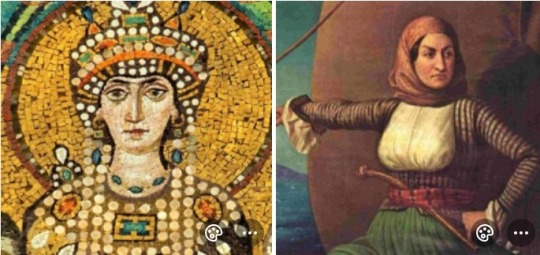
Theodora was a Byzantine empress and Justinian's wife, acting at one of his advisors. She held an important role during the Nika riots.
Laskarina Bouboulina was Greek naval commander and heroine of the Greek War of Independence (1821). Considered the first woman in Greece to gain the rank of admiral
28 notes
·
View notes
Text
12 works, PORTRAIT OF A LADY, Bouboulina, the Heroine naval captain during Greece's War of Independence, with Footnotes #212
Eugène Delacroix (1798–1863)La Grèce sur les ruines de Missolonghi/ Greece on the Ruins of Missolonghi, c. 1826Oil on canvas Edit this at Wikidataheight: 208 cm (81.8 in); width: 147 cm (57.8 in)Musée des Beaux-Arts de Bordeaux The defeat of the Greek insurgents at Missolonghi which fell on April 29, 1826 at the hands of the Turks. The news of the fall of the most powerful fortress of Greece…
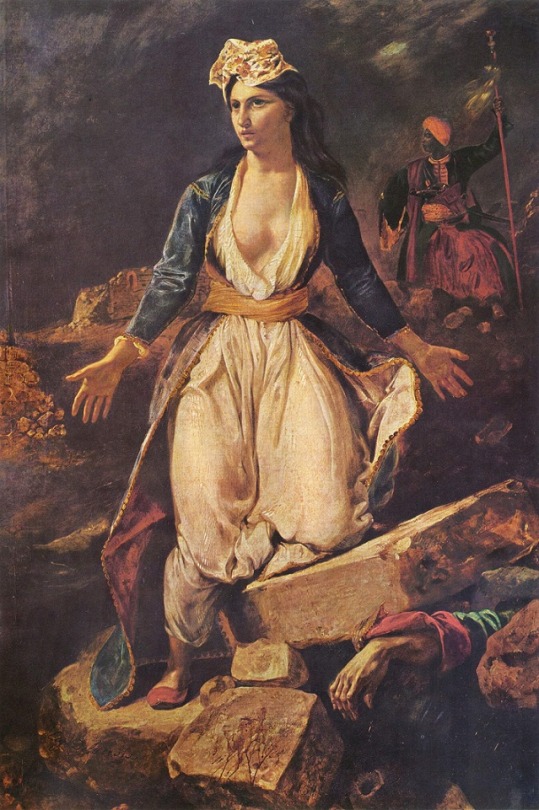
View On WordPress
#Art#Artists#Biography#Bouboulina#Colorful#Feminine#Fine Art#footnotes#Greece#History#Independence#Painting#PORTRAITOFALADY#war#Woman#Zaidan
0 notes
Text
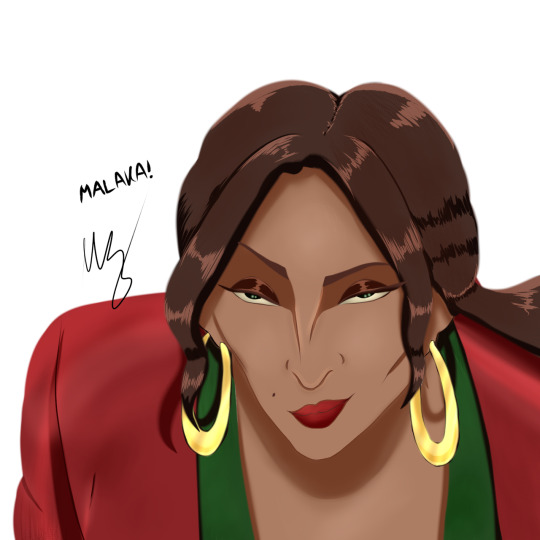
Laskarina Bouboulina from Zafara (2012).
3 notes
·
View notes
Text
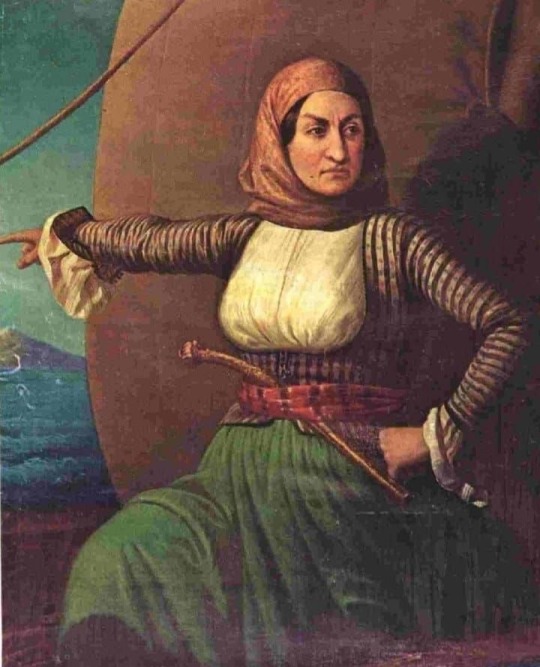
Laskarina Bouboulina — NHM, Athens
A few days after her death, a Russian delegation presented her with the honorary rank of Admiral of the Russian Navy, granted by Tsar Alexander I of Russia, making her the first woman in world naval history to hold this title.
3 notes
·
View notes
Text
If you want to watch content about Greece, do watch the National Geographic documentary Europe from Above. It has six seasons so far and S6E1 is about the Greek islands. (In the second season they had done Greece in general again but I have already made a post about that one - both are recommended). It’s a very interesting documentary, even I learned things I had no idea about.
It has a few inaccuracies here and there but it’s overall surely above average. The biggest foul is not showing Crete for the winter segment - dude, Crete has countless mountain ranges and two that are ultra, what the hell are you doing in the fortress in Corfu?! 😭
National Geographic brainstorming how to show winter in the Greek islands:

Another one I remember now is them saying that mastic is used as gum and toothpaste flavour and that in the Middle Ages it was worth as much as gold… dude it’s literally one of the most potent natural remedies for digestion and gastrointestinal issues… 😭😭 how on earth do you know the rest but consider insignificant to mention that
But don’t let me doing my whiny thing sway you if you are interested. The documentary is really good.
Honourable mentions:
That dude who is a descendant of Laskarina Bouboulina?!?!??!?!!?! 👀👀👀👀
The Sims background music during Santorini’s segment caught me so off guard - well played National Geographic I give you that one
Story time: I have a (not so famous) app for reviewing movies and tv series and I went there to check the ratings and it’s the latest episode so it only has a couple ratings so far and one of them was giving one star. And I thought, what the hell, I understand it not being your kind of thing or expecting something else but this is just too harsh, there is literally nothing in this documentary indicating that it could even remotely deserve something close to a freaking one star out of ten! But then I forgot about it and I was about to write in the honourable mentions above about National Geographic casually Greeking it up and showing an anniversary festival for a sea battle of the Greeks against the Ottomans and it was literally like “so they set the Turkish flagship on fire and see how they revive this moment now and yeah after three tries the Turks never came back Greeks finally got rid of them”. And as I was about to comment on it, I realised, shit, that one star rating could have been Turkish. Imagine that Turk reviewer be like “I came here to have a good time and I’m honestly feeling so attacked right now” oh my goddd 😭😭😭
But okay, like I said, it has these moments that are a little funny but overall very good documentary!
#greece#europe#Europe from above#national geographic#review#documentary#Greek islands from above#Greek islands#funny#random
23 notes
·
View notes
Note
What really sucks is how, while many Greek Jews have been here for literally centuries, and even for the ones that came later on, still, our traditions are so heavily linked with the standard Greek traditions (Purim which is our Apokries, has been transferred for a long time, two weeks earlier and is celebrated during the Christian Apokries instead of the standard)and it sucks that people still claim that "jews are not truly Greeks" and how we don't belong here. Sadly I have been hearing that rhetoric even more lately to the point that I don't mention that I'm Jewish to people I don't know well, in case they are weirdos. And the way that the government is going (far right with the Spartans and everything) I don't see the situation getting better soon.
What's your opinion on this theitsa;
Hello! :) First of all, thank you for entrusting me with your thoughts! It means a lot!
It irks me when I hear "they don't belong here" about people who have been citizens of this country for a very long time! (it irks me regardless, but whatever) What the fuck "belong" even means?? And who the fuck decides that?? They are here, they are citizens, they are part of the Greek history, the end! Even more so if these people speak Greek, they have Greek education, they live the Greek reality every day, they fight for the same things as the rest of the Greeks, and so on.
It sucks that this country makes you feel like you have to hide, or explain yourself in case they learn you are Jewish. This shouldn't have to happen! And, to be fair, no one is 100% "pure" Greek (I hate the concept of purity but I mention it here for argument's sake). We all have at least ONE ancestor of Slavic (/Arvanite), German, Turk, Egyptian, Hebrew, Armenian, Persian etc descent. We don't live in a bubble! Markos Botsaris (+ his crew) and Laskarina Bouboulina were Arvanites!
For this reason, I think "How Greek" one is, shouldn't define how much respect they get as Greek citizens. We are all enclosed in the same borders under a common government and we will achieve shit if we give in to infighting about who is The Best.
At the same time, I don't mean to diminish your argument about Jewish Greeks having Greek cultural elements. It makes sense that Jews in Norway and Jews in Greece won't have the exact same culture, and that they will be affected by the culture around them. I imagine it's hurtful when this part of your identity is overlooked. I'm just saying that all people here are "allowed" to be here, since our law has allowed it.
I wish I could tell you "don't be afraid! go forth and be yourself!" but realistically you will be the judge of what's safer for you. At least from my perspective, most Greeks won't have an issue. They might be very interested, even. But one or two times there will be Greeks who will create an issue for you. And these bigoted Greeks might be even more than we think.
The "funny" thing about far-right parties like the Spartans is that, while they claim to be "for Greece", they seem to parrot USAmerican rhetoric (non-Greek rhetoric) which goes against how the locals historically viewed the Jews in Greece.
Correct me if I am wrong, anon, but I feel like the rise of antisemitism in our days is very connected to the US-Americanization of Greece? This type of antisemitism (the type of conspiracies) and the intensity is the exact same I see from people in the US who worry when Jews are in positions of power.
Now, it's a historical truth that certain Greeks worked with the Nazis for power, at the time Greece was under Nazi/Axis occupation. (The Greeks still hate these families that were Germanophille at the time, because these families also worked against the interests of the rest of Greeks) So antisemitic sentiments existed before. But the land of what is now Greece was under the Ottoman Empire for centuries and the Ottoman Empire was a haven for Jews who were heavily discriminated against and killed in West Europe.
Many Jews acquired power and influence in big Greek cities like Thessaloniki, owning factories, businesses, newspapers, and real estate. They were allowed to prosper and they were an important part of our societies. (The Byzantine Museum of Thessaloniki has an exhibition this year about the Thessalonian Jewish community. It's outside and left of the cafeteria, they have a new room)
At the same time, obviously, being Jewish didn't make you automatically rich and influential. Before the second world war, there were Greeks and Turks, and French who were very rich and influential, too. Traditionally the Greeks understood this was a Class thing, not an Ethnicity thing. (And, in any case, no people deserve a freaking genocide!!!) But my point is, in the Old Times I didn't see sentiments such as "oooo the Jews are here to control us!!" whereas I feel this is a big part of the Greek antisemitic rhetoric today.
The reason I think this sentiment is brought by the US is that in the US there are many Jewish communities and many have acquired wealth or they had generational wealth. But in Greece there as soooo few Jews and they don't hold the same amount of wealth. Like, the bigoted conspiracies of the far right don't even make sense in the Greek reality 😂
For those who don't know: Despite the efforts of Greek Jews to escape the holocaust and the efforts of many Greeks to help them escape in the Επαρχία (rest of the country, outside of Athens), like in Zakynthos, an extremely large number of Jews in Greece got killed by the Axis powers in the Second World War. Hence, the large Jewish population of Greece has dwindled, and the community is really small nowadays. The community (at least in Thessaloniki) is also cautious to open their culture to other Greeks because they fear antisemitic sentiments might hurt them again. (Which is understandable to me. Btw I heard this cause a friend writing her thesis needed access to the Hebrew records in Thessaloniki)
Sorry for the long response, anon! My thoughts were many, as you can see. I would be very happy if you could tell us more things about Greek Jewish culture, if you don't mind! (how it's similar or dissimilar to the more frequent version of Greek culture) I could not find many things online, or even in museums, about it and I am genuinely curious.
Feel free to correct me on historical stuff, if you have different info! I am sure we would all be better for learning it because so much culture and historical perspective was lost from the collective average Greek consciousness with the holocaust. I hate that this gap gave rise to the rhetoric of far-right parties. I would also like to be more equipped to speak against their antisemitism by knowing more facts.
I also wonder if it's any awkward celebrating Hanukkah as a Greek Jew? 😅 I think it's not awkward (because the Greek Seleucid Empire was a looong time ago), but I am really curious if the Greek Jews think some way about it.
#greek jewish#romaniote#<- anon might not identify with this but I'd like someone to also find this post while looking for Jews in Greece#so it's just for convenience purposes#answered
16 notes
·
View notes
Text
My cousin's dog is named Boubou and I keep calling her Bouboulina and every time it reminds me that Bouboulina is the winner of the Greek sexywoman/iconic woman polls
7 notes
·
View notes
Text
Uncover the five top things to do on the secret island getaway that celebrities don't want you to know about.
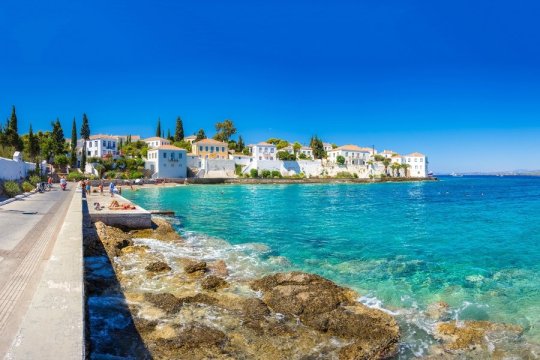
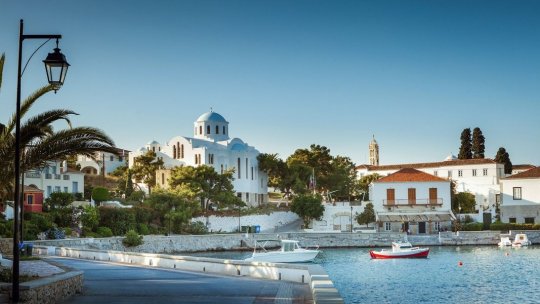

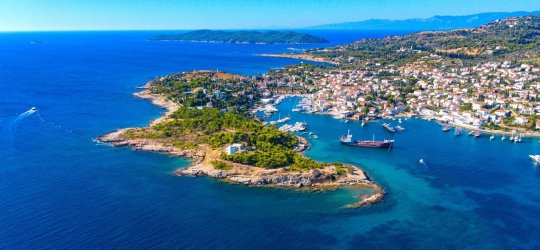
Nestled in the Saronic Gulf, Spetses is a short distance from Athens and close to other picturesque islands like Hydra and Poros. It's a haven of tranquillity where you can truly escape from the hustle and bustle of everyday life. It's
This island gem is also famous for producing the most exquisite almond sweets, so without further ado, let me give you a taste of the top 5 things to do and see in Spetses.
Explore the Old Harbour: The heart and soul of Spetses, the Old Harbour is brimming with charm and character. Wander the narrow, cobbled streets and admire the traditional architecture of the elegant mansions. Grab a coffee at one of the quaint waterfront cafes and watch the world go by.
2. Visit the Bouboulina Museum: This fascinating museum is dedicated to the heroine Laskarina Bouboulina, who played a significant role in the Greek War of Independence. Discover her incredible story and more.
3. Relax on Agia Marina Beach: A trip to Spetses would only be complete with some beach time, and Agia Marina is the perfect spot to soak up the sun. The crystal-clear water is ideal for swimming, and there are plenty of sun loungers and umbrellas for a relaxing day at the beach.
4. Take a scenic bike ride: With its relatively flat terrain and stunning coastal paths, Spetses is perfect for exploring by bike. Rent a bicycle or e-bike and enjoy a leisurely ride around the island. Stopping at hidden coves and charming villages along the way, it's a fantastic way to immerse yourself in the island's natural beauty.
5. Join a traditional Greek cooking class: What better way to immerse yourself in local culture than learning how to create mouth-watering Greek dishes? Participate in a cooking class and discover the secrets behind classic recipes like moussaka and souvlaki.
#goexploregreece#greece#travel#mustvisit#mustsee#beautiful views#spetses#saronic#thingstodo#things to do#greek island#greek islands#travel tips#travel destinations#europe#holiday#vacation#travelblogger#tuesday
6 notes
·
View notes
Text
A Marinha informou hoje (7) que três navios são suspeitos pelo derramamento de óleo no litoral brasileiro em 2019. As informações foram divulgadas após a retirada do sigilo do relatório da investigação, que foi entregue à Polícia Federal (PF) e ao Ministério Público Federal (MPF) em agosto do ano passado. As conclusões são utilizadas pela PF em um inquérito criminal sobre o caso. “Com o apoio de instituições técnicas e científicas, públicas e privadas, brasileiras e estrangeiras, três navios foram apontados como principais suspeitos: Navio-Tanque (NT) BOUBOULINA; NT VL NICHIOH (em maio de 2020, o navio alterou seu nome para NT CITY OF TOKYO); e NT AMORE MIO (em março de 2020, o navio alterou seu nome para NT GODAM)”, informou a Marinha. Na época dos fatos, as manchas iniciais de óleo apareceram a 700 km da costa brasileira (em águas internacionais) e atingiram mais de 250 praias do Nordeste. No comunicado, a Marinha também defendeu investimentos no monitoramento de navios. “Esse evento, inédito e sem precedentes na nossa história, traz ensinamentos, como a necessidade de se investir no aprimoramento do monitoramento dos navios que transitam nas águas jurisdicionais brasileiras e nas suas proximidades, destacando o Sistema de Gerenciamento da Amazônia Azul (SisGAAz)”.
0 notes
Text
LASKARINA BOUBOULINA // NAVAL COMMANDER
“She was a Greek naval commander, heroine of the Greek War of Independence in 1821, and considered perhaps the first woman to attain the rank of admiral. During her youth she developed an interest in sailing which was facilitated by her stepfather’s liberal attitude to education. She was widowed twice, inheriting a considerable sum of money from her second husband. She later allegedly joined the Filiki Etaireia secret society which sought to achieve Greek independence from the Ottoman Empire, being among the few women to do so. Following the outbreak of the Greek War of Independence, she commanded a fleet of Spetsiot ships which contributed to several campaigns most notably the siege of Nafplion. Following the defeat of her faction in the Greek civil war in 1824, she was briefly imprisoned and expelled to Spetses. She was killed in 1825 during the course of a family feud.”
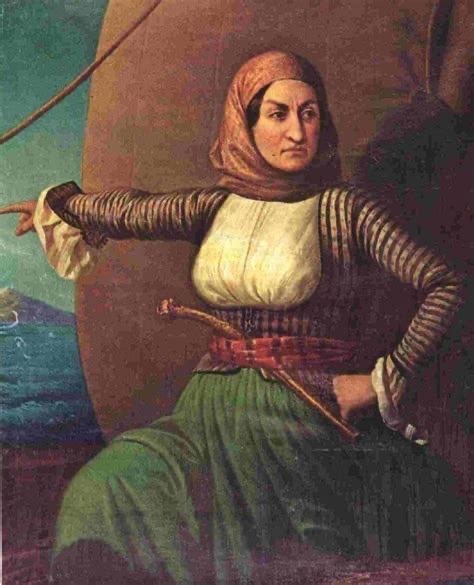
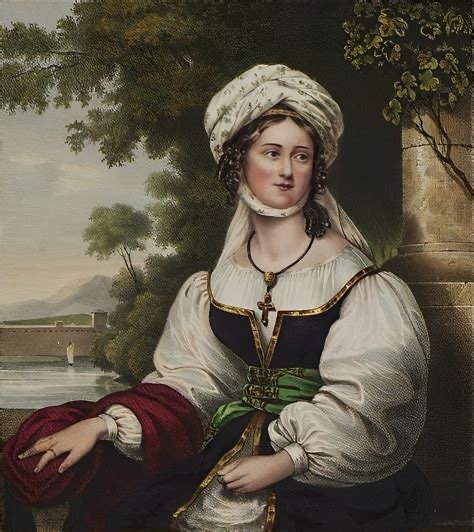
0 notes
Text
I mean, we're on tumblr alright, but I am voting for the one willing to die in battle and also super respected and valued amd obeyed among war chief men in the 19th century so ... Laskarina my love <3
* oh and she called the flagship she owned and was commanding Agamemnon, like, top that fr

Bouboulina be like “it’s a trade ship m’lords”
FINAL ROUND


Sappho is known for her lyric poetry and was regarded as on of the greatest lyricists of ancient Greece. She is regarded as the symbol of women loving women, with the words "sapphic" and "lesbian"deriving from her name and home island.
Laskarina Bouboulina was Greek naval commander and heroine of the Greek War of Independence (1821). Considered the first woman in Greece to gain the rank of admiral
#giga legend#now simping for Bouboulina#laskarina bouboulina#but of course Sappho is great#it’s just that you can’t beat bouboulina#Greek history#greek people#Greeks
135 notes
·
View notes
Text
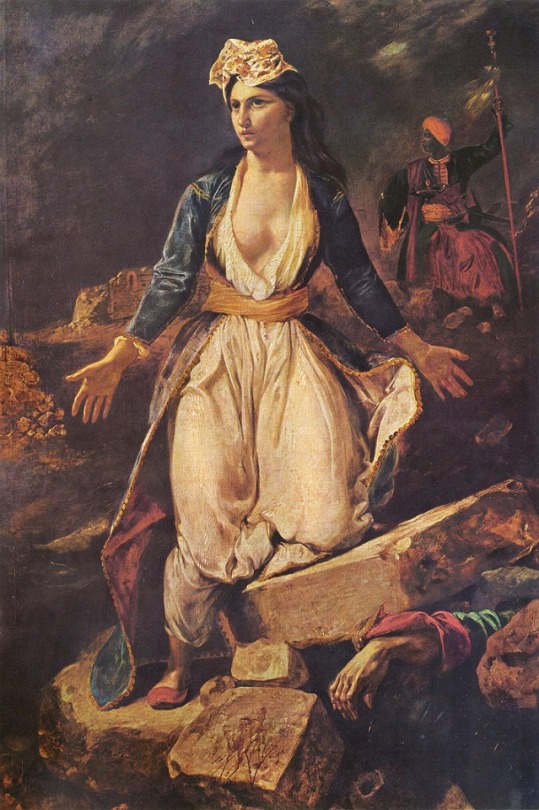
The defeat of the Greek insurgents at Missolonghi which fell on April 29, 1826 at the hands of the Turks. The news of the fall of the most powerful fortress of Greece mobilized the Philhellenes of Western Europe and revived sympathy for the Greeks…
Please follow link for full post
Greece,Bouboulina,Independence,War,PORTRAITOFALADY, painting, Zaidan, Art, biography, Artists, History, FOOTNOTES, Woman, Colorful, Feminine, fine art,
12 works, PORTRAIT OF A LADY, Bouboulina, the Heroine naval captain during Greece's War of Independence, with Footnotes #212
#PORTRAITOFALADY#painting#Zaidan#Art#biography#Artists#History#FOOTNOTE#Woman#Colorful#Feminine#fineart
1 note
·
View note
Text
Laskarina Bouboulina
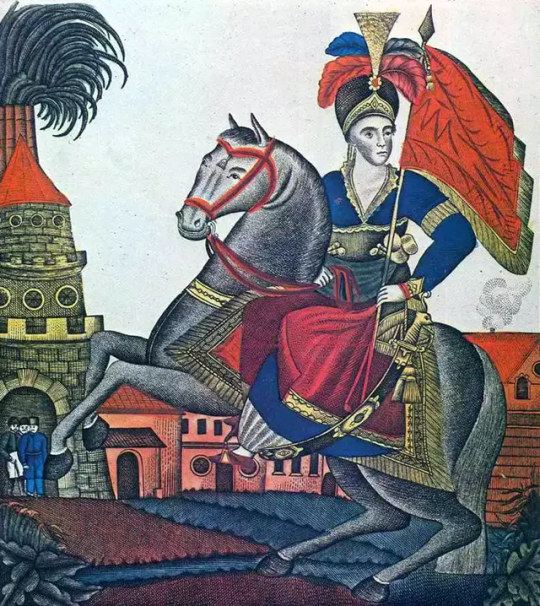
Laskarina Bouboulina · Admiralin und See-Kommandantin
Laskarina Bouboulina Pinotsis (Λασκαρίνα Μπουμπουλίνα Πινότση; 11. Mai 1771 - 22. Mai 1825) war eine griechische See-Kommandantin im Unabhängigkeitskrieg 1821 und die erste Frauenadmiralin der russischen Kaiserlichen Marine. Bouboulina wurde in einem Gefängnis in Konstantinopel geboren. Sie stammte von der Insel Hydra. Sie war die Tochter von Stavrianos Pinotsis, einem Kapitän von der Insel Hydra, und seiner Frau Skevo. Die Osmanen hatten Pinotsis für seine Rolle in der gescheiterten Orlof-Revolution von 1769–1770 gegen die osmanische Herrschaft inhaftiert. Bei einem Besuch ihrer Mutter wurde sie dort geboren. Ihr Vater starb kurz darauf und Mutter und Kind kehrten nach Hydra zurück. Sie zogen vier Jahre später auf die Insel Spetses, als ihre Mutter Dimitrios Lazarou-Orlof heiratete. Bouboulina hatte acht Halbgeschwister. Sie heiratete zweimal, zuerst Dimitrios Yiannouzas und später den wohlhabenden Reeder und Kapitän Dimitrios Bouboulis, woher sie ihren bekannten Nachnamen hat. Bouboulis wurde 1811 im Kampf gegen die algerischen Piraten getötet. Die damals 40-jährige Bouboulina übernahm sodann sein Vermögen und sein Handelsgeschäft und ließ auf eigene Kosten vier weitere Schiffe bauen, darunter das große Kriegsschiff Agamemnon. 1816 versuchten die Osmanen, Bouboulinas Besitz zu konfiszieren, weil ihr zweiter Ehemann im letzten Krieg für die Russen gegen die Türken gekämpft hatte. Sie segelte nach Konstantinopel, um den russischen Botschafter Stroganov zu treffen und um seinen Schutz zu bitten. In Anerkennung von Bouboulis Dienst an den Russen schickte Strogonov sie auf die Krim. Dort traf sie sich mit der Mutter von Mahmud II., die späteren Berichten zufolge ihren Sohn überzeugte, Bouboulinas Eigentum ihr wieder zu überlassen. Nach drei Monaten Verbannung auf der Krim kehrte Bouboulina nach Spetses zurück. Angeblich trat Bouboulina der Untergrundorganiation Filiki Etaireia bei, die Griechenland auf die Revolution gegen die osmanische Herrschaft vorbereitete. Man behauptet, sie wäre eine der wenigen Frauen dieser Organisation gewesen. Bouboulina kaufte Waffen und Munition auf eigene Kosten und brachte diese heimlich auf ihre Schiffe, um, wie sie sagte: "meiner Nation willen" zu kämpfen. Der Bau des Schiffes Agamemnon wurde im Jahr 1820 fertiggestellt. Sie bestach türkische Beamte, damit die Größe des Schiffes ignoriert wurde. Agamemnon war später eines der größten Kriegsschiffe in der Hand griechischer Rebellen. Sie organisierte auch ihre eigenen bewaffneten Truppen, die sich aus Männern von Spetses zusammensetzten. Dabei verbrauchte sie den größten Teil ihres Vermögens, um die Matrosen und Soldaten unter ihrem Kommando mit Essen und Munition zu versorgen. Am 13. März 1821 hisste Bouboulina auf dem Mast von Agamemnon ihre eigene griechische Flagge, die auf der Flagge der byzantinischen Kaiser von Comnenus basiert. Das Volk von Spetses rebellierte sodann und schloss sich mit weiteren Schiffen aus anderen griechischen Inseln Bouboulina an. So segelte sie mit acht Schiffen nach Nafplion und begann eine Flottenblockade. Später beteiligte sie sich an der Marineblockade und der Gefangennahme von Monemvasia und Pylos. Ihr Sohn Yiannis Yiannouzas starb im Mai 1821 in der Schlacht von Argos gegen die überlegennen osmanischen Truppen. Bouboulina kam am 11. September 1821 in Tripolis an, als die Stadt fiel und traf sich mit General Theodoros Kolokotronis. Während der Niederlage der osmanischen Garnison rettete Bouboulina die meist weiblichen Mitglieder des Hauses des Sultans. Als gegnerische griechische Parteien 1824 erneut einen Bürgerkrieg anfachten, verhaftete die neue griechische Regierung Bouboulina wegen ihrer Familienverbindung mit Kolokotronis, ihr Schwiegersohn wurde während der Ereignisse getötet. Schließlich wurde sie nach Spetses verbannt. Ihr gesamtes Vermögen für den Unabhängigkeitskrieg war mittlerweile erschöpft. 1825 wurde Laskarina Bouboulina infolge einer Familienfehde in Spetses getötet. Die Tochter einer Koutsis-Familie und Bouboulinas Sohn Georgios Yiannouzas waren entlassen worden. Auf der Suche nach seiner Tochter ging der Vater des Mädchens, Christodoulos Koutsis, mit bewaffneten Familienmitgliedern zu Bouboulinas Haus. Nach einem Streit mit Christodoulos Koutsis schoss jemand auf sie. Bouboulina wurde mitten in die Stirn getroffen und sofort getötet. Der Mörder wurde nie identifiziert. Nach ihrem Tod gewährte Kaiser Alexander I. von Russland Bouboulina den Ehrenrang eines Admirals der russischen Marine und sie war damit bis vor kurzem die einzige Frau in der Geschichte der Weltmarine, die diesen Titel trug. Das Schiff Agamemnon wurde später an den griechischen Staat verkauft und in Spetsai umbenannt. Auf der Insel Spetses befindet sich heute das "Bouboulina Museum" in dem 300 Jahre alten Herrenhaus von Bouboulinas zweitem Ehemann Bouboulis, in dem auch noch ihre Nachfahren leben. Eine Statue von ihr steht im Hafen von Spetses. Zu ihren Ehren wurden auch verschiedene Straßen in ganz Griechenland und Zypern benannt, insbesondere die Bouboulina-Straße in der Nähe der Nationalen Technischen Universität von Athen (Polytechnion) und des Nationalen Archäologischen Museums von Athen, im Zentrum von Athen sowie in Piräus und in Nikosia. Laskarina Bouboulina · Admiralin und See-Kommandantin · Person Read the full article
0 notes
Text
"LASKARINA BOUBOULINA: HEROINE OF THE GREEK WAR OF INDEPENDENCE"/Balladeer's Blog
LASKARINA BOUBOULINA: HEROINE OF THE GREEK WAR OF INDEPENDENCE
View On WordPress
0 notes
Note
Which greek hero (or heroine) of the Greek War of Independence you find underrated, in a sense we don't hear about them as often as some other familiar names, like Kolokotronis, Karaiskakis, Androutsos, Mavrogenou, Bouboulina and countless others I don't have the patience to list?
Ypsilantis, but I mean Demetrios, not Alexander. Demetrios is not well known or he is only known as the little brother of Alexander and for his engagement to Manto Mavrogenous, but he was far more than that. In my opinion, he is way more significant than his brother or at least more successful at what he set out to do.
Demetrios Ypsilantis (1793 - 1832) was a Greek prince, born in Constantinople, and serving as a military officer in the Imperial Russian Army. Ypsilantis was trained in the military schools of France.
After his brother Alexander became the leader of the Filiki Eteria (Society of Friends), the organisation of Greek expats who was conspiring for the Greek Revolution, and made some wrong choices and the rebellion in the Danubian Prinicipalities failed, he was held confined for several years and couldn't come to Greece to join the cause he was the leader of. Hence he sent Demetrios in his place, under full secrecy. Demetrios had to escape many witnesses, obstacles and dangers in order to arrive to Greece. He also went to Odessa first, gathering money from Greek expats there for the cause. He also mortgaged a lot of his own fortune and heirlooms for the cause.
As soon as he arrived to the Peloponnese, he assumed the role of the leader of the revolution and he befriended Kolokotronis, Papaflessas and Anagnostarás. Other war captains weren't very appreciative of him but with his peaceful and reconciling spirit, he managed to be accepted by most. Demetrios didn't have the image of a leader or military officer, he was only 27 year old, balding and of a small and fragile stature.
Demetrios was actually in charge of the Siege of Tripolitsá. However he had to leave as the Turkish army was attempting to reach the Corinthian Gulf and he had to confront them, so the massacre in Tripolitsá broke out in his absence. As soon as he learnt of the bloodshed, he quickly returned to Tripolitsá, ended the atrocities and actually provided refuge to Turkish or other Muslim civilians in danger.
He defended Nafplion against the huge forces of Dramali Mahmud Pasha (~30,000 men) with a tiny garrison of 700 men! Demetrios lasted for 12 days and then the garrison was dissolved. However, these 12 invaluable days gave Kolokotronis the opportunity to prepare his army, take hold of critical positions in the Peloponnese and of course burn the crops. This led to the Battle of Dervenakia against Kolokotronis, in which Dramali lost ~24,000 of his men.
While he was elected leader of the National Assembly, Demetrios refused to take sides in the infighting between the war captains and the intellectuals - this made him less powerful but also earned everyone's respect. He was adamant that all Greeks should fight united.
His biggest success was his second defense of Nafplion alongside General Yannis Makriyannis in the Battle of the Lerna Mills, this time against Ibrahim Pasha of Egypt. Here are the stats in wiki:
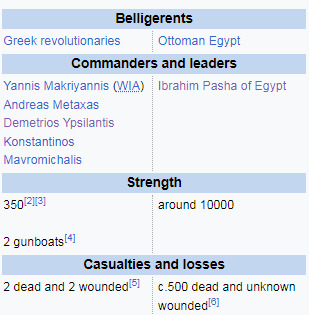
Once Greece became an independent state, Governor Ioannis Kapodistrias appointed Demetrios as the General Commader of the troops in Eastern Greece. In this position, he gave several victorious battles against the Turks in Boeotia, most notably including the Battle of Petra, on 25 September 1829, which was the official ending of the active operations of the Greek War of Independence. So, Demetrios completed the war his brother started!
Demetrios was in love and engaged with fellow heroine Mantó Mavrogenous. Ioannis Kolettis, a politician and the forefather of corruption in Greek politics already, fearing that such a marriage between two wealthy heroes could have enormous influence over the Greek populace, defamed Mantó relentlessly to Demetrios. Demetrios was swayed and broke up with her, breaking her heart.

Again, despite his bravery, Yspilantis was frail and prone to illnesses. He died young, at the age of 39, due to illness. Some speculate it might have been some form of muscular dystrophy but nothing is certain. In his funeral, Georgios Tertsetis said "He chose to sacrifice everything for his country, without ever allowing hatred to cast a shadow in his soul". Historian Konstantinos Vaskalopoulos called Ypsilantis as "the potentially purest and most selfless of the captains of the Greek War of Independence".

#greece#history#greek history#greek revolution#greeks#greek war of independence#demetrios ypsilantis#greek people#modern greek history#ask#attichoney4u
28 notes
·
View notes
Note
wrt the nationalism i experienced at my old Greek School, which was part of the larger North London Greek Community even if it was technically just outside London, I remember there were big get-togethers of the various schools for the likes of 25th March. Normal stuff really. I remember we were asked to do some art, and as I was a teenager literally called Peace and with a conscientious objector for a dad, I was pretty opposite in values to the general militarism etc around it, so i slightly... took the piss by drawing Bouboulina anime-fied in a way that was Well Drawn but also Not Reverent.
Anyway, the thing that actually shocked me amongst all this (as opposed to just a bit of discomfort and eyerolling). As a fluent speaker, the teachers liked to show me off by writing speeches for me to give at some events. My tutor had written, very carefully, a big speech for me, and usually I begrudgingly went along with them, but i refused to read this one bit, in which I was expected to declare (cw: self harm, implied suicide, blood): <...κι αν χρειαστεί, δεν θα διστάσω να ανοίξω τις φλέβες μου σαν βρύσες ��ια να ποτίσω το δέντρο της ελευθερίας, ζήτω η Ελλάδα, ζήτω η Κύπρος, ζήτω η ελευθερία>. When I refused point-blank, he looked at me with confusion and said - bearing in mind that i was 16 at this time - so wait, you Wouldn't die for your homeland???? Also bearing in mind this was 13 years ago or so and its still pretty embedded in my memory.
Idk how representative this particular anecdote is but as this was intended for a large event i imagine it wasn't expected to be controversial. He was a little extra I think, probably in part to being a Cypriot refugee himself and therefore having a v different emotional relationship w nationality. Despite module options for A levels (final exams/qualifications for subjects for 18yrolds in the UK) that included Greek Lit and Greek Poetry, he'd only teach Cypriot History and Cypriot Geography, which to me, as an Athenian who generally sucks at any kind of History or Geography, didnt really appeal. I only found out there were other modules when I got to the exam and saw them available. Seeing as they were available, I assume he was something of an outlier, as most kids doing Modern Greek exams would probably have been 3rd-gen Cypriots.
Γειααα! Given the Greek history and how we preserve remembrance, I don't think the sentence you mentioned is controversial, either. But as always, there's more nuance to it, so please bear with me! (quick historical recap for people not familiar with recent Greek history + the psychology of Greeks and Greek immigrants)
Under the boot of the Turks, the Bulgarians, the Italians, the English (and who knows who else) Greeks (and other Balkan nations) quickly realized that advocating for people with the same ethnicity was the only way not to be assimilated at best and eradicated at worst. For centuries Greeks weren't heard by their masters (who also called them "chattel" - "ραγιάδες") at times so after 400 and 600 years they said "if you don't advocate for us, if you treat us like this, fuck you, we are going to become independent". Since 1821 they became an example of revolt for all slaves in Europe and the Americas (without claiming they were the only inspiration) and warmly greeted and aided by Haiti, the first nation to abolish slavery.
I don't need to write much about the Balkan wars, ww1, and the Macedonian struggle, where being ethnically Greek automatically made you an enemy. (without saying Greeks were always on the right side of things or never committed any atrocities), or mention the Greco-Turkish War which ended with the peak of the Greek (Armenian and Assyrian, too) genocide.
Additionally, most of us have heard how the Greeks were treated in ww2 under the Bulgarians and under the Italians and Germans when the country was occupied. Or about the Greek programs in USSR (1937) and Turkey (1955 and 1960) to erase the Greek identity that in many ways still goes on to this day. (Pushing for the Turkish and Russian language and customs only, calling the Greek history of oppression "propaganda", erasing names of Greek villages, etc)
Again, being Greek was pretty much a ticket to punishment and oppression.
Cyprus is included in many of these cases as it suffered long from the Turks until 1878 and then it fell to English hands who filled the citizens with hallow promises (and good ol' colonialism) and let them eat each other alive - resulting in the Turkish occupation of half the island. Although all citizens suffered from the turmoil and the Greek side wasn't a saint, it was mostly random average Greeks who were kicked out of their homes when the invasion happened (1974).
War after war created a generational trauma that cannot be shaken away and that can affect someone when they've lived around people who remember their family getting executed by Turks, or Bulgarians. In that climate, fighting for your ethnos to the point of bleeding became something natural, like bleeding for freedom of speech, worker's rights, for lgbt+ rights, refugee rights, and more.
So, yes, your tutor definitely came from this background so I am not surprised he was that way after living through the tensions and being forced to leave his home because he wasn't the "right" ethnicity. His love for his ethnicity differs from the love a native UK or US person has, in the sense that it comes from the side of the oppressed, not the oppressor. (On top of that, he could also be a weird person as a character, since you mentioned he didn't want to teach anything that wasn't related to Cyprus)
There's no coddling up for how much blood was shed, no χρυσό χάπι for what a country does to you when it occupies you. I want to stress a lot how I hate the idea of war and the idealization of war. However, one doesn't exactly speak politely to the new oppressor, who wants to assimilate others and spread their own influence. I haven't seen a nation talk its way out of occupation and the inevitable repression, so to speak. And when the n-th invasion happens for Greece (for our specific hypothetical example) I don't think there will be any change in how things will be resolved. In a way, the school events remind you that, and also that history is a cycle.
With Turkey as a neighbor, things are still politically tense, and many Greeks still fear another invasion. (At the moment I don't think Turkey will attack for many reasons and bc we are NATO allies but I am telling how the situation is) Let's not forget our state has been allied with Russia for a long time and we betrayed that bond with whatever sanctions might come from Russia to us. When Russia invaded Ukraine, most Greek men around me were fearing the draft. From where we stand on the map, we don't exactly feel safe. War is a possibility and many Greeks feel fight-ready psychologically, or jumpy when they hear the news. (I belong to the chill group and still get anxious from time to time) That might color the patriotic statements with an intensity that doesn't feel natural in other nations which may not feel that close to getting a war on their soil.
As for the militarization in the events, the first thing I'll say is that war and the army can be totally rotten and there's a ton of propaganda we must resist, and I'll admit that even the Greek army when doing the defense has crossed the line at times. Buuuut realistically, it's difficult to resist an invasion from - say - the nazis without an armed force. That's why the army has a place in Greek remembrance events.
Thousands of Greeks fought in the frozen Pindus mountains against the Axis force because they all knew what would happen if the enemy got to Greece. And lo and behold, once the fascists took control of my city, thousands were sent to concentration camps where they were incinerated (700 recorded children among them). In just three years, 1/3 of Greece died under occupation. Fighting to prevent that - even if they failed eventually - is objectively valiant. Not to mention, the resisting armies of various countries achieved weakening the Axis forces to the point they finally got beaten.
Of course, there is no need for panic in the present. No objective need or extreme speeches where teens shout "I will shed my blood". I am fully aware of how expressions of the desire to protect what was - again with blood - given can be weird and reach extremes. Such yearly school events are the norm in Greece.
It's worth mentioning that such texts were written (or based on texts written) at the time of the oppression so they are emotionally charged and often carry the bloodshed of war which was very real for the country back then. That's the reason they are not considered controversial. (add to the mix the constant fear of imminent invasion we still live in 2023)
Another reason they may not be considered controversial is that we are used to them but also don't exactly follow them. Such events may be a yearly reality here (multiple times per year) but a kind of mundane one and people go about their lives without so much gravity given to the event statements.
Sure, it's atmospheric and it's good to remember the dead, but it's the usual grind, ya know... We get reminded of the war for a few days in very sentimental ceremonies and then we move on. The majority of Greeks in Greece are unlike your tutor, in spite of taking part in these school festivities and in the school parade. And the teachers are usually chill about it.
It can have negative effects, though. For starters, I believe the student parade accompanying the military was established during the 70's junta where nationalism was often regarded as the solution. So we are not on a good base here 👀
Most Greeks shun extreme militarism (we know what disgusting people lead in our army and what bigoted ideas they hold) and the belief that we are better than other nations. I can totally understand how a 16-year-old could feel uncomfortable when made to read the phrase you were made to read. In Greece, I think most (not all) 16-year-olds would roll their eyes and go along (because we know it's mainly fanfare for the drama 😂) and they wouldn't be phased by it.
For example, my teen self would perhaps read the "κι αν χρειαστεί, δεν θα διστάσω να ανοίξω τις φλέβες μου σαν βρύσες για να ποτίσω το δέντρο της ελευθερίας, ζήτω η Ελλάδα, ζήτω η Κύπρος, ζήτω η ελευθερία" and see some poetry in it BUT I wouldn't actually want to do it 😅 Nobody does and nobody cares, except the few rare radical people, who exist in all countries in equal measure. And we know that the rest of the students just wanted to stay out of class and didn't give two shits about how serious this is supposed to be 😂 We were aware we were preaching to the choir - who already knows this stuff and just wanted to go home. We are kinda desensitized, I think.
But teens also have their own political sentiments, which may clash with how the school festivities are organized, so we should take them into account. The students (and all people) should be free to not partake in events opposite to their ideals. And many teachers, too, are uncomfortable with how these events are conducted and wish to tone them down. There are some teachers here who are more into it so they add more passion and grand statements.
Different areas and families experienced oppression and genocide in various ways, so I don't have a concrete statement fit to dictate how much passion and poetic symbolism they'll use in their remembrance events and how they promise that the same harm will never come to their families again - as long as one doesn't fall into bigoted traps and militarization. Meaning that if the issue makes them sentimental and they want to mention blood and blades against slavery, that's their own thing.
But it also means that you are (obviously) allowed to remember the fallen and celebrate the existence of the nation without bold statements if you don't feel like it. (Or perhaps one doesn't want nations to exist at all so we go to another level altogether, and maybe you don't want a remembering at all, which is another discussion)
Thank you very much for reading all this! I wrote so many things to demonstrate Greek history is quite heavy and complex, which in turn creates complex situations for the people who are left to do the remembering.
Other people who took part in such Greek events, write your opinions down if you like!
#greek history#nationalism#national identity#idk what other tags to put really#greeks of diaspora#slavery#answered#modern Greece
14 notes
·
View notes